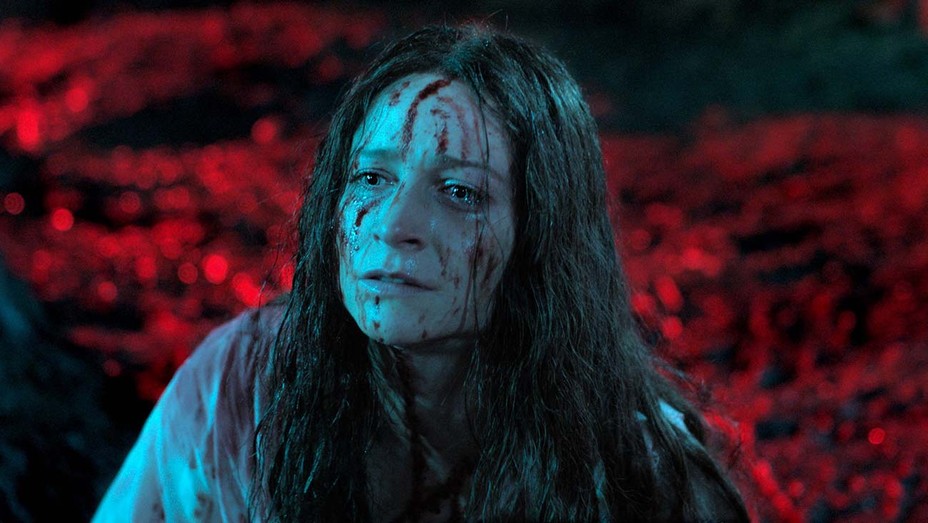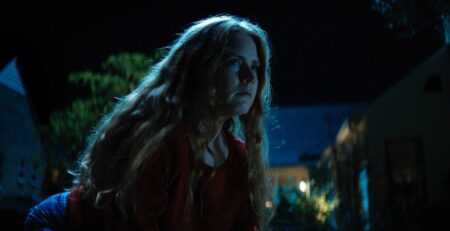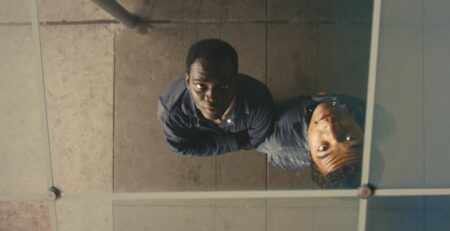
Tethered to everything from first-person shooters to Halloween slashers, a certain question has plagued entertainment for decades: does onscreen violence influence real-life action? The answer is long, complicated, and seldom agreed on which means the question is continuously raised. Delving into the subject with bold aesthetics and morbid curiosity, Censor explores gore and consciousness with unsettling ease.
Immersing viewers in the mind of film censor Enid Baines (Niamh Algar), the film offers a mysterious slow burn with no shortage of genre commentary. In a scene that’s indicative of the entire film, Enid turns the corner down a dark passageway, leaving viewers in her wake, just a few too many beats behind her. By the time the camera makes the turn, she’s already descended into an unlit corridor, too submerged in darkness to be perceived. Censor is Enid’s journey into total darkness. Seduced by violence and haunted by loss, she gets closer with each passing moment and thus, further from the audience. In that, the film builds itself to fit neatly into the legacy of horror but, unfortunately, fails to deliver in its final act.
Enid is very quickly established as meticulous, so much so that she is quietly mocked by coworkers for her dedication. She takes her job more seriously than most, fueled by a personal desire to protect audiences from horrific content. Amplifying her ambition is the guilt that she’s internalized after the childhood disappearance of her sister, Nina. Though she was present, she was never able to recall the details necessary to save, or even continue the search for Nina. Clinging to this guilt, she has chosen a career that allows her to save others from potential violence. Bubbling beneath the surface is a morbid curiosity, present in even the minute details of Algars’ performance. Given Enid’s constant exposure to gory decapitations and graphic assaults, combined with her lingering trauma, Censor becomes a meta-commentary on the questions it raises. Sure enough, viewers begin to question the effect her job has on her psyche.
As a psychological mediation, Censor is intriguing. The mass hysteria of the 80s makes a perfect backdrop for Enid’s slow descent. Adding to this is director Prano Bailey-Bond’s visual style, an ode to 1980s horror aesthetics that relishes in its every stylistic choice. With crisp cinematography and an effective score, the unnerving atmosphere pushes the audience to question Enid’s reality from the inside. However, the film ultimately lets this build-up fizzle out, disorienting where it should be satisfying. Thematically, things never quite come together, abandoned in favor of style and flair.
Horror has long been linked to catharsis, which Censor seems wholly aware of. The film’s events trace Enid’s search for relief from the pressure and guilt that’s haunted her since childhood. Accompanying her on this journey, immersed in her psyche as suspense slowly builds, the audience too seeks catharsis. This makes the final act a devastating blow. The messy blend of fiction and reality that viewers come to grapple with seems detached from the clever meta-commentary that has characterized the film thus far. The narrative fails to match up to its fascinating subject matter, with a story that’s not as polished as the direction.
Despite its missteps, Bailey-Bond’s directorial debut shows immense promise for her work to come. Censor is stylish, provocative, and self-aware in the best ways. The film capitalizes enough on these aspects to hit a stride of bold, cinematic storytelling, though it never quite figures out where to go from there. A fascinating character study, this film sparks an interesting conversation with the rest of the horror genre.
Censor was screened during the 2021 Sundance Film Festival.
Censor
-
Rating - 6.5/106.5/10
TL;DR
Censor is stylish, provocative, and self-aware in the best ways. The film serves as a fascinating character study, with plenty of commentary on the genre and flair of 1980s horror classics. Unfortunately, Censor’s themes never quite come together and its final act is much more disorienting than satisfying.




